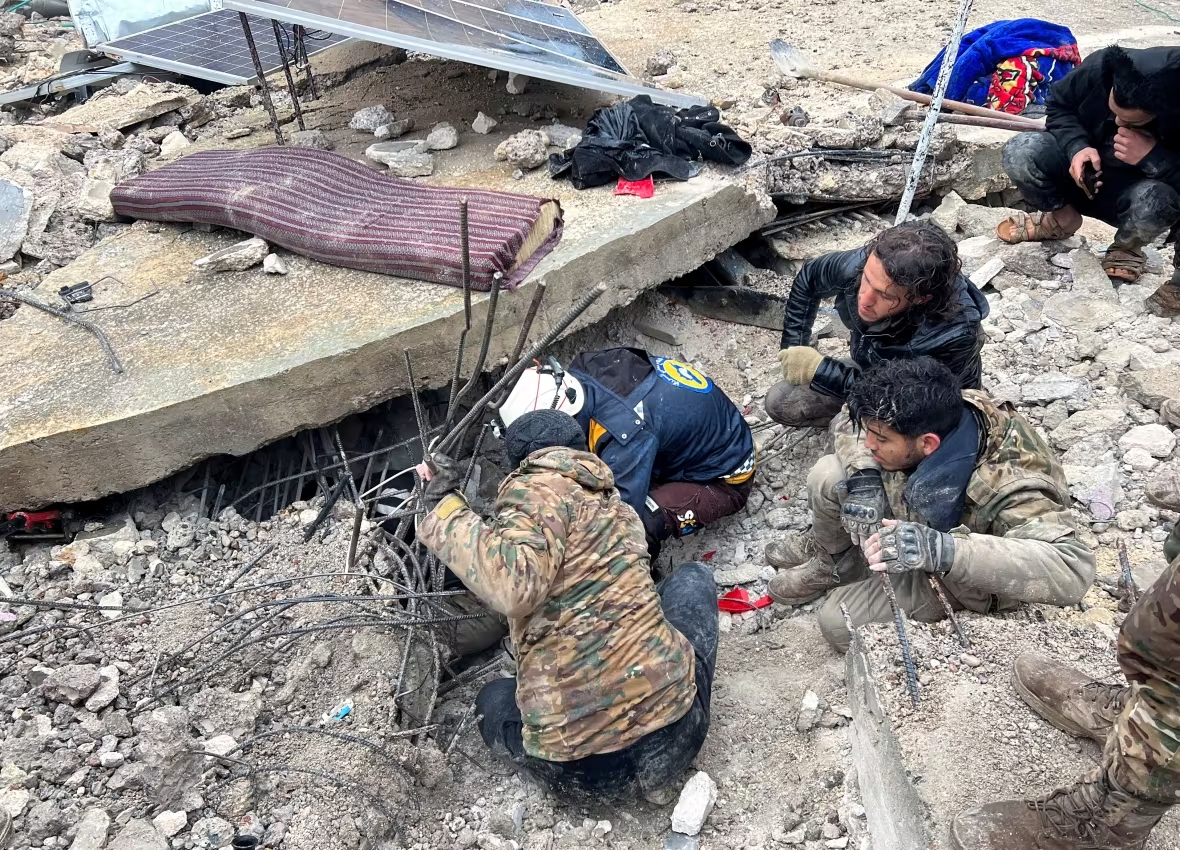
President Bashar al-Assad has expressed his appreciation of help from world countries to the Syrian nation and government in the recent devastating earthquake, stressing, however, that many countries are "under pressure from the United States" not to help the Arab country.
Damascus, February 10 (RHC)-- President Bashar al-Assad has expressed his appreciation of help from world countries to the Syrian nation and government in the recent devastating earthquake, stressing, however, that many countries are "under pressure from the United States" not to help the Arab country.
Assad made the remarks in a meeting with a Lebanese delegation headed by caretaker Foreign Minister Abdallah Bou Habib who traveled to the country to follow up on the latest status of the deadly earthquake in Syria.
The Lebanese delegation emphasized that their trip to Damascus was aimed at expressing solidarity and sympathy with the Syrians as “the Lebanese people consider themselves partners in this grief with the Syrian nation and government, and feel obliged to be with their Syrian brothers in this situation.”
The Lebanese delegation also reviewed measures taken by the country’s caretaker government to provide assistance to the Syrian institutions working in the field of relief and rescue of the earthquake victims.
“Lebanon is ready to serve the Syrian people and that it has opened its airfields and ports to dispatch aid to the country from all directions,” Bou Habib said.
Assad, for his part, expressed his gratitude to the Lebanese government and people for the practical measures taken to provide the necessary facilities and aid to the victims of the Syrian earthquake and said such aids were very effective and boosted the morale of the Syrian people.
In the meeting with the Lebanese delegation, the Syrian president also underlined the significance of cooperation between Beirut and Damascus in all fields based on the capacities of the two countries and their shared interests. Appreciating Lebanon and all the countries that rushed to help Syria in the critical situation, Assad said, “We know that many countries are under pressure from the United States not to help Syria.”
Bou Habib also met with his Syrian counterpart Faisal Mekdad during the trip and underlined that the Lebanese are “ready to help their Syrian brothers in every way.” “The Syrian people have always stood by Lebanon in the most difficult situations and we have a duty to stand with them,” the top Lebanese diplomat underlined.
Bashar al-Jaafari, Syria’s ambassador to Moscow, lambasted on Thursday the West’s discrimination against the Syrian people, saying more aid shipments were being sent to Turkey than Syria following the devastating earthquakes that hit both countries.
Jaafari also denounced U.S. sanctions that are hampering relief work in quake-stricken areas of the Arab country, saying they are “a serious obstacle” to the flow of aid to Syria.
The disastrous earthquake hit Turkey and neighboring Syria in the wee hours of Monday. The 7.8-magnitude temblor has so far killed more than 21,000 people in total in the two countries.
As rescue efforts continue in Syria following massive earthquakes there, calls are growing for the US and its allies to remove their sanctions, which are said to be hampering international aid efforts in the country.
In an interview with Lebanon's al-Mayadeen television network on Tuesday, Mekdad highlighted Syria’s need for humanitarian assistance after the recent deadly earthquake, warning that the U.S. sanctions have worsened the circumstances as the illegal bans have prevented the delivery of everything to the country.
Earlier this week, the Syrian Arab Red Crescent (SARC) called on the United States and the European Union to lift the siege and economic sanctions imposed on Syria that are severely hampering relief work in quake-stricken areas of the country.
The US government has over the past years imposed sweeping economic sanctions against Syria amid the Arab nation’s uphill battle for reconstruction and recovery. The controversial Caesar Syria Civilian Protection Act, signed into law by former President Donald Trump, targeted individuals and businesses anywhere in the world that participated either directly or indirectly in Syria’s economy.
The restrictive measures have blocked imports of essential goods, affecting the Syrian people’s access to medical equipment, food, heating, gas, and electricity.
In related news, France's political approach to the Syrian government will not change, a foreign ministry spokesman said on Thursday. "Our political approach is not changing and contrary to Bashar al-Assad we are working in favor of the Syrian population," deputy foreign ministry spokesman Francois Delmas told reporters in a briefing.
"Only a political process defined by United Nations Security Council 2254 can lead to an exit of the crisis."
France cut off diplomatic ties with Damascus and has backed militant groups for years. While President Emmanuel Macron has entertained the idea of nurturing some contacts with Damascus since coming to power in 2017, that re-engagement has never taken place amid a certain amount of reluctance within parts of the diplomatic corps and French political establishment.
The rapprochement between some Arab states, Turkey and Damascus in recent months has also put the issue back on the table.

